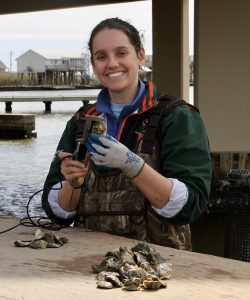 Sarah Bodenstein joined UConn Extension a few months ago as the regional aquaculture liaison for Connecticut Sea Grant and NOAA’s Milford Lab. Though she has only been here a short time, Sarah has already begun connecting with Connecticut’s shellfish farmers and immersing herself in the traditions, history, and challenges of the aquaculture industry along Long Island Sound.
Sarah Bodenstein joined UConn Extension a few months ago as the regional aquaculture liaison for Connecticut Sea Grant and NOAA’s Milford Lab. Though she has only been here a short time, Sarah has already begun connecting with Connecticut’s shellfish farmers and immersing herself in the traditions, history, and challenges of the aquaculture industry along Long Island Sound.
Originally from Chicago, Sarah discovered her passion for marine science as an undergraduate at the University of Miami, where she studied the oceans from both scientific and applied perspectives. She says she has “always loved the aquaculture sector and everything that’s involved with it,” a passion that has shaped her academic path and her career.
Her graduate work took her to two of the nation’s major centers of oyster research. She earned her master’s degree from Auburn University, working in the Extension oyster hatchery and studying how environmental conditions influence oyster quality. “My master’s research focused on how the environment affected the survival and growth of oysters,” she says. “Being able to work directly in the hatchery made everything feel more connected—what we discovered in the lab immediately mattered to someone on the water.”
Sarah then continued on to complete her Ph.D. at Louisiana State University, conducting research within their oyster hatchery system and expanding into interdisciplinary problem solving. She applies industrial engineering principles to aquaculture, exploring how practices that work in controlled laboratory settings can be scaled in ways that actually function for commercial hatcheries. “We often come up with a protocol that works well in the lab, but then spawning or whatever process we’re testing doesn’t work in the hatchery,” she explains. “The difference is scale. Integrating industrial engineering helps us think through how industry will use something and make it applicable.”
Her postdoctoral work with Louisiana Sea Grant strengthened her interest in Extension and translating research for the industry. “Sea Grant is the bridge between academia and the general public,” she says. “Knowing people in the industry is vital—anything we work on needs to be wanted by the industry. And helping the public understand and support that work is an important part of the mission too.”
That commitment to bridging science and practice defines her new role with Connecticut Sea Grant and UConn Extension. Sarah describes herself as “basically an aquaculture liaison,” helping ensure that the tools, research, and resources developed at NOAA’s Milford Lab and Connecticut Sea Grant reach those who need them most. “A lot of my work in Louisiana was making sure the industry could apply what we were doing in ways that made sense for them,” she says. “That idea of bridging the gap is really interesting to me.”
Part of her job is also listening—getting to know Connecticut’s aquaculture community, learning their challenges, and identifying opportunities where science and innovation can support industry needs. She’s already excited about the conversations happening around Long Island Sound. “I’m really excited to learn about the history and tradition of aquaculture here, and to see how it’s the same and different from Louisiana,” she says.
Sarah is also an avid maker and enjoys bringing creativity into her scientific work. She often uses 3D printing to prototype new tools or test equipment designs, combining engineering, biology, and practical problem solving. “Integrating different disciplines helps make work more applicable,” she says. “That’s something I really hope people take away from my work—the power of interdisciplinary approaches to solve real problems.”
Outside of her professional life, Sarah loves being outdoors. She enjoyed experiencing her first Connecticut fall foliage, getting out on the trails, and enjoying the state’s natural landscapes. She also hopes to get back into sailing—something she grew up doing on Lake Michigan.
With her passion for applied science, experience across multiple oyster research institutions, and commitment to industry partnerships, Sarah brings a fresh, interdisciplinary perspective to UConn Extension and Connecticut’s aquaculture community. We are excited to have her on board and look forward to the work she’ll lead with aquaculture farmers, researchers, and coastal communities in the years ahead.